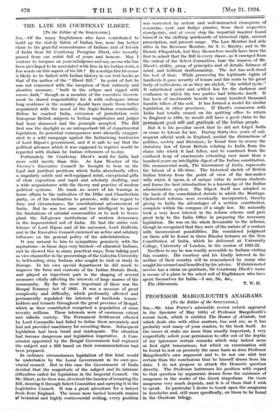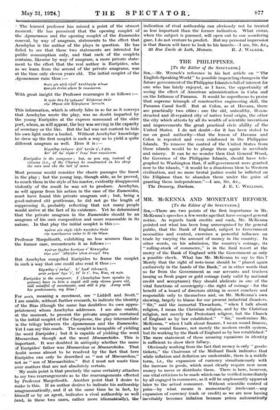PROFESSOR MARGOLIOUTH'S ANAGRAMS.
[To the Editor of the SPECTATOR.] Srn,—Mr. Alan Porter's admirable review (which appeared in the Spectator of May 10th) of Professor Margoliouth's recent book, which is entitled The Homer of Aristotle, but which deals also with other matters, has sent me, as it has probably sent many of your readers, to the book itself. As the issues at stake are more than usually important, I very respectfully solicit your permission to offer out of the depths of my ignorance certain remarks which may indeed seem at first sight temerarious, but which on examination will be found to rest on precisely the same basis as does Professor Margoliouth's own argument and to be not one whit less certain than the conclusions that he himself draws from his data. I do not propose to attack the Homeric question directly. The Professor buttresses his position with regard to that question by arguments drawn from the existence of anagrams in the works of the Greek tragedians. On these anagrams very much depends, and it is of them that I wish to speak. In particular I desire to touch upon the anagrams in Aeschylus and, still more specifically, on those to be found in the Orest,ean trilogy. The learned professOr has missed a point of the utmost friornent:-Re has perceived that the opening couplet of the Agamemnon and the opening couplet of the Eumenides conceal, by way of anagram, statements to the effect that Aeschylus is the author of the plays in question. He has failed to see that these two statements are intended for public consumption only, and that each of the couplets contains, likewise by way of anagram, a more private state- ment to the -effect that the real author is Euripides, who As we learn from the second of the private anagrams, was at the time only eleven years old. The initial couplet of the .Agamemnon runs thus :— Bean e1v alra Tare araXXaylir wcivor fpaupat irehis tifiKos IC04/441.61,01.
With great insight the Professor rearranges it as follows :- & 87n7 83) ypttagar' aXXdocrom irv
tenKas vidr gexpopfwvos 'Ar-rucOr.
This information, which is utterly, false in so far as it conveys that Aeschylus wrote the play, was no doubt imparted by the young Euripides at the express command of the older poet, whom, as will appear, the boy was serving in the capacity
of secretary or the like. But the lad was not content to hide his own light under a bushel. Without Aeschylus' knowledge he drew up the first couplet is such a way as to yield a quite different anagram as well. Here it is :—
Etiporiont er4Increv• licrri3, 7', 8957,s, &yr' Ile' ILA' (Aptly r' gicate orwr xoyminsevos.
• Euripides is the composer ; but, as you say, instead of citizens (i.e., of the Chorus) he constructed in his sleep the ears and eke the tail of asses.
Most persons would consider the choric passages the finest in the play ; but the young imp, though able, as he proved, to couch them in the style of his Master, evidently disapproved violently of the result he was set to produce. Aeschylus,
as will appear from his action in the case of the Eumenides, must have found this private anagram out ; but, being a good-natured old' gentleman, he did not go the length of suppressing it,. probably reflecting that not many people
would arrive' at the fact of its existenee. Yet he determined
that the private anagram in the Eumenides should be an anagram of his own composition and more reasonable in its
nature. In that play the initial couplet is this
wparov eirXit Tithe wpecr19e6o, Oe&iv Thr 11341014/4.arTLY yam, Ic 81 ris
Professor Margoliouth, exhibiting no less acumen than in the former case, reconstructs it as follows :—
apt:yr:op 16.,ufleav Sevripwv r' BOrarrthr plar 'AiMpigtev 7150r crrotxeg
But Aeschylus compelled Euripides to frame the couplet fit such way that one Could also read it thus :—
EDparlom 7' evOrter:. lr' Owe' irEezaerij, • arr ap4aor' 1200 r', to' Or r'. lrw, Bias, ii TO.
Euripides is the composer. I (Aeschylus here speaks in person) have in him a cupid still only eleven years old, still mindful of sweetmeats, and still a pig. Away with his predecessors, my Bias !
For prok meaning a sweetmeat, see "Liddell and Scott." I am unable, without further research, to indicate the identity of the Bias (though the name has doubtless its own appro- priateness) whom Aeschylus addresses. I am also unable, At the moment, to present the private anagram contained in the initial couplet of the Choephoroe, the play intermediate in the trilogy between the Agamemnon and the Eumenides.
Yet I can say this much. The couplet is incapable of yielding
the word Euripides ; but it is capable of yielding the word Mnesarchus, though not the word Mnesarehides. This is
Important.' It was • doubted in antiquity whether the name
al Euripides' father was Mnesarchus or Mnesarchides. That doubt seems almost to be resolved by the fact that here
Euripides can only be described as "son of Mnesarchus," not as "son of Mnesarchides." But I must not waste time over matters that are not absolutely certain.
My main point is that precisely the same certainty attaches to my two rearrangements as to the rearrangements effected by Professor Margoliouth. Another point that I desire to Make is this. If an author desires to indicate his authorship
anagrammatically, and if at the same time he in fact, by himself- or by an agent, indicates a rival authorship as well (and, in these two cases, rather more idiomatically), the indication of rival authorship can obviously not be treated as less important than the former indication. What vistas, when the subject is pursued, will open out to our wondering gaze, I do not venture to predict. But my personal impression is that Bacon will have to look to his laurels.—I am, Sir, ezo.,











































 Previous page
Previous page